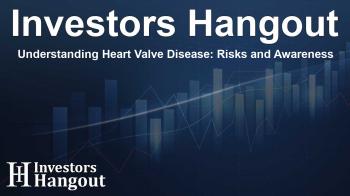Understanding Heart Valve Disease: Risks and Awareness

Understanding Heart Valve Disease and Its Risks
February serves as a vital month for raising awareness about heart health, marking its significance with various events dedicated to promoting heart-related issues. One such important occasion is Heart Valve Disease Awareness Day, which focuses on the risks and implications of heart valve disease.
The Importance of Awareness
Heart valve disease is a serious condition where one or more of the heart's four valves become damaged or defective. This interruption in blood flow can lead to various complications, some of which can be fatal. Disturbingly, over 11 million individuals in America suffer from heart valve disease, contributing to more than 25,000 deaths annually.
Who Is Most at Risk?
Age emerges as the most significant risk factor for heart valve disease. Individuals aged 65 and above should prioritize regular check-ups to monitor their heart health. As stated by Dr. John Whyte, Chief Medical Officer for WebMD, it's crucial for older adults to have their hearts evaluated, as doctors can detect heart murmurs and recommend necessary tests to address potential concerns.
Signs and Symptoms to Watch For
Recognizing the symptoms of heart valve disease is essential for early diagnosis and treatment. Common signs include lightheadedness, fainting, irregular heartbeats, chest pain, fatigue, edema, and an overall sense of malaise. Many instances of heart valve disease can be identified through the detection of heart murmurs during a routine stethoscope examination. If a murmur is found, further diagnostics such as EKGs, chest X-rays, or MRIs are typically conducted.
Further Complications and Related Factors
Statistics suggest that approximately 10% of individuals aged 75 and older are likely to experience moderate to severe forms of heart valve disease. Age, along with other health conditions like previous heart attacks, hypertension, high cholesterol, diabetes, and certain cancers, compounds an individual's risk.
The Role of Community and Education
It's important to note that heart valve disease may develop earlier in individuals from communities of color, thus necessitating earlier screenings and proactive healthcare practices. Increasing awareness and understanding of these disparities can significantly improve health outcomes.
How to Get Involved
For those interested in learning more about heart valve disease and how to educate others, resources are available to aid in spreading awareness. Engaging with advocacy groups and attending community events are excellent ways to participate. Educational efforts during events like Heart Valve Disease Awareness Day can positively impact many lives.
About the Alliance for Aging Research
The Alliance for Aging Research has been a trusted authority on health information since 1986, especially concerning diseases that predominantly affect older adults. This organization is committed to enhancing health awareness and promoting the independence of senior citizens through influential advocacy campaigns. Recognizing the challenges associated with heart valve disease, the Alliance emphasizes the need for greater awareness and education on this prevalent issue.
Frequently Asked Questions
What is heart valve disease?
Heart valve disease occurs when one or more of the heart's valves do not function properly, impacting blood flow and potentially leading to serious health issues.
Who is most at risk for developing heart valve disease?
Individuals over 65, especially those with other cardiovascular risk factors, have a higher likelihood of developing heart valve disease.
What are the common symptoms of heart valve disease?
Symptoms can include fatigue, irregular heartbeats, chest pain, lightheadedness, and fluid retention in the legs.
How can heart valve disease be diagnosed?
Diagnosis often involves detecting heart murmurs through a stethoscope, followed by additional tests like EKGs or MRIs for further evaluation.
What can be done to raise awareness about heart valve disease?
Participating in events, educating communities, and supporting health organizations can all contribute to greater awareness of heart valve disease.
About The Author
Contact Addison Perry privately here. Or send an email with ATTN: Addison Perry as the subject to contact@investorshangout.com.
About Investors Hangout
Investors Hangout is a leading online stock forum for financial discussion and learning, offering a wide range of free tools and resources. It draws in traders of all levels, who exchange market knowledge, investigate trading tactics, and keep an eye on industry developments in real time. Featuring financial articles, stock message boards, quotes, charts, company profiles, and live news updates. Through cooperative learning and a wealth of informational resources, it helps users from novices creating their first portfolios to experts honing their techniques. Join Investors Hangout today: https://investorshangout.com/
The content of this article is based on factual, publicly available information and does not represent legal, financial, or investment advice. Investors Hangout does not offer financial advice, and the author is not a licensed financial advisor. Consult a qualified advisor before making any financial or investment decisions based on this article. This article should not be considered advice to purchase, sell, or hold any securities or other investments. If any of the material provided here is inaccurate, please contact us for corrections.

